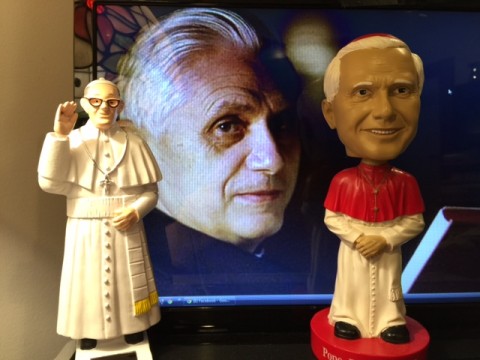A few weeks ago I found myself in the middle of a dust-up on social media. A supposed “fan” of Pope Benedict made a remark that, in light of what I know of the Pope Emeritus from my reading, made no sense to me. So I asked this rather cranky anonymous entity about it, and there ensued a very strange conversation; the more I quoted Benedict to this person, the angrier he or she became with me.
It was the tenderness of Benedict that seemed to be throwing this person off.
“Tenderness” is a word that has been used with some frequency by his successor, Pope Francis; it is not a word people associate with Benedict. For the ignorant and the perpetually angry, Papa Ratzinger is only a caricature –“God’s Rottweiler”. For the First Guardians of the Church Militant he is stern Commander-in-Chief which is, in fact, another kind of caricature.
What Benedict was, and is, is a Christ-lover; for the agenda-driven — whatever their pet-issue — this means he is all-Christ’s before he is anything else. It means, too, that to plumb his depths is to begin to drown in love that is maddening in a way, because it relentlessly points us away from our own concerns (and we are a generation that demands attention) for something deeper and finer; something that makes us truly royal children of a Revolutionary King.
What ended the social media session of cyber-contretemps was my reminding the cranky-one of Benedict’s exhortation, that all people needed to hear the words, “it is good that you exist”.
The conversation ended there, because a tender Benedict was of no use at all to this person’s agenda, which was to make the church behave the way he/she thinks it ought to.
And that’s everyone’s agenda, to a point, because we are all Eves and this is still Eden, and we would all be like as God, if everyone would just prostrate themselves to our ideas.
What was most interesting about the whole engagement, though, was the response of someone else — a Catholic-Junkie and witness to the melee — who, reading through the mess of input, saw those words “it is good that you exist” and, assuming they belonged to Pope Francis, remarked “very Jesuitical!”
That person, too, was shocked to learn that the words came from Benedict.
It says a great deal about how susceptible we are to media narratives and headlines — and how lazily we accept them as gospel-truths — that even those of us who are actively engaged with our Catholicism accept rather simplistic interpretations of our Popes. The occupants of Peter’s chair are all, by necessity, complex men whose intelligences are woven through the warp and woof of faith and reason. Many who will openly admire Benedict for his deep intellect and his doctrinal clarity, will fail to see his humility or his warmth. Those who see nothing but humility and warmth in Francis seem not to notice that this well-educated man doesn’t move on doctrine, except as to how we might best serve it within humanity.
What people miss, with both men, is that they are wholly and fully Christ’s, first and foremost, and therefore they are imbued with radicalism, but not as the world understands it.
Over Christmas, I gave a friend of mine a copy of Co-Workers of the Truth: Meditations for Every Day of the Year. She likes “daily-reading” books, but when she saw it was Ratzinger-written she objected. “You know I don’t like him,” she told me.
Yes, I knew. She is someone who distrusts the press, and yet she had wholly bought into the Ratzi-Nazi narrative. “But you’ve never read him.” I said. Reminding her that she is a fair-minded person, I urged her to give the book a chance.
Yesterday, she called me up in tears. “He is beautiful!” She said. “I had no idea!”
It seems that a daily serving of Benedict had begun to warm her up, but what got her blowing her nose over the phone was the excerpt for Tuesday, February 18th:
“The sum of human life does not strike a balance if we omit God; in that case, only contradictions remain. It is not enough, then, to believe somehow theoretically that there is a God; we must regard him as the most important element in our life. he must be everywhere. And our fundamental relationship to him must be love.
That can often be very difficult. It can happen, for instance, that one individual has many illnesses. . .poverty makes life difficult for another. Yet a third loses the persons on whose love his whole life depends. . .And there is a great danger that the individual will become embittered and will say: God can certainly not be good; if he were, he would not treat me this way.
Such a revolt against god is very understandable; often it seems almost impossible to accept God’s will. But one who yields to this rebellion poisons his whole life. The poison of saying No, of being angry with God and with the world, corrodes the individual from within.
But what God asks of us is, at is were, and advance of confidence. He says to us: ‘I know, you don’t understand me yet. But trust me anyway, believe that I am good, and dare to live by this trust.’ There are many instances of saints and great individuals who dared to trust and, in consequence, found for themselves and for others true happiness amid the greatest darkness.”
— from Auf Christus schauen pp 109-110
“It sounds just like Francis! Like something he would say!” My friend said.
Indeed. The voice of the Vicar of Christ is the voice of a tender shepherd who really does understand us, even if we do not understand, or do not allow ourselves to understand, him in all of his iterations.
That sounds like Francis? That sounds like Benedict? That sounds like John Paul II; that sounds like John XXIII; that sounds like Gregory the Great; that sounds like Leo the Great; that sounds like Sylvester; that sounds like Clement.
That sounds like Peter.
Now who is going to harm you if you are enthusiastic for what is good? But even if you should suffer because of righteousness, blessed are you.
Do not be afraid or terrified with fear of them, but sanctify Christ as Lord in your hearts.
Always be ready to give an explanation to anyone who asks you for a reason for your hope, but do it with gentleness and reverence, keeping your conscience clear, so that, when you are maligned, those who defame your good conduct in Christ may themselves be put to shame.
For it is better to suffer for doing good, if that be the will of God, than for doing evil.
1 Peter 3:13-17
The Papacy is an office of tenderness, served under a heavy cross.













